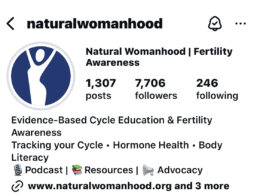If you somehow managed to get through your whole adolescence without being offered birth control to “regulate” your period, chances are good you were probably offered the Pill to control your teenage acne—after all, many physicians can be strangely pushy when it comes to contraception for a whole host of reasons.
We’ve already covered why the Pill can’t actually regulate your period, so now we’ll talk about how the Pill fails at getting to the root causes of acne, too.
One of the key culprits behind acne is hormones—specifically androgens, the most notable of which is testosterone. During puberty, the same fluctuating hormones that can cause what appears to be irregularity in an otherwise normal cycle, can also cause greater production of sebum, an oil produced by sebaceous glands in the skin.
Excess sebum can trap dead skin cells and bacteria within pores, clogging them and leading to the production of acne. Because of the relationship between hormones and acne, many doctors are quick to turn to hormonal birth control in order to treat acne in teenage girls and young women. Birth control pills—particularly those that contain synthetic forms of the hormones estrogen and progesterone—can lower the level of androgens in the body, which can help suppress some (though rarely all) of acne production.
Hormones exist in a delicate balance. Too much or too little of a particular hormone can cause tidal waves of changes in a woman’s reproductive system and overall health. And while testosterone is produced in much larger amounts in male bodies, women’s bodies (specifically ovaries) also produce small amounts of testosterone. An overabundance of testosterone can cause severe acne (among other issues), but the right amount of testosterone is vital to good reproductive and overall health. For example, testosterone in women plays a role in sex drive, bone and muscle strength, and mood. And while birth control can depress testosterone levels, which may help improve acne (although it can only treat it, not cure it), it may also lead to a whole host of other issues.
When one size doesn’t fit all
If acne is largely due to a hormonal imbalance, wouldn’t it be best to get to the root cause of that imbalance, rather than continuing to throw your hormones out of whack?
Because bad acne can often be a sign of larger underlying health issues like Polycystic Ovarian Syndrome (PCOS), getting your reproductive health in order can often help treat acne, too. Doctors trained in Natural Procreative Technology (NaPro) are specially trained to root out many of the underlying hormonal issues that often lead to acne and treat them without using the Pill.
If your acne isn’t extremely severe, there are some changes you can make at home to improve things. Consider trying some of these tips to get your acne under control naturally:
1. Decrease your sugar and refined carb intake (and possibly dairy, too)
As it turns out, sugar might be a huge culprit in hormonal imbalances in general. Researchers suspect that higher levels of insulin (which is the body’s response to high sugar intake), may lead to a greater release in acne-causing hormones. Some studies have also found that cutting back on dairy intake may help improve acne as well—although the reason for this correlation isn’t yet understood.
2. Drink lots of water—and coffee doesn’t count!
Drinking lots of water hydrates the body and helps cut down on inflammation, which may help promote clearer skin, too. Unfortunately, coffee doesn’t count, as the caffeine in coffee can actually contribute to higher levels of cortisol (the stress hormone), which may lead to an increase in acne.
Which leads us to our next tip…
3. Decrease your stress levels
There is a positive correlation between stress and acne, although the connection is not entirely understood. One theory is that increased levels of cortisol may have an effect on the sebaceous glands, leading to an increase in sebum production, promoting greater acne production. Getting enough sleep and exercise can help combat high stress. By the way, when it comes to managing stress, your birth control Pill might be doing more harm than good.
4. Wear better make-up, and wash it off at the end of the day
Make sure your cosmetics are non-comedogenic (non-pore clogging), non-drying, and made without skin-irritating chemicals. Always gently wash your makeup off at the end of the day, and consider using a cleanser with a mild acne treatment like benzoyl peroxide or salicylic acid. Moisturizing with a non-oil based moisturizer is a good idea, too, to prevent skin from becoming too dried-out and promoting the cycle of irritation.
Anyone struggling with acne can tell you that it’s a problem that goes more than just skin deep. Bad or severe acne can be intensely embarrassing and lead to scarring; there’s even a chance that it can affect employment opportunities. People dealing with bad acne aren’t unnecessarily concerned with their appearances; severe acne is a real, oftentimes painful issue, and those who suffer from it deserve good treatment with real results.
Unfortunately, the Pill doesn’t deliver the best results for acne. Just as it masks a whole host of other underlying issues, the Pill can’t actually treat acne—only suppress its symptoms. If you are serious about treating your acne and improving your overall health, you’re better off learning a Fertility Awareness Method (FAM) and understanding your natural hormone cycle. If you find that your acne is still severe even after implementing these healthy changes, consider seeing a doctor trained in FAMs and restorative reproductive medicine to help address the possible underlying causes of your acne. There are more effective ways to improve skin health than shutting down your reproductive system.
This article was originally published as written by Grace Emily Stark on August 8, 2018. It has since been updated by Natural Womanhood to offer more information.
Last updated April 4, 2022
Additional Reading:
Fix Your Sleep, Fix Your Menstrual Cycle
The Pill and Stress: How Hormonal Contraception Might Make it Harder for You to Cope
Insulin Resistance, PCOS, and Fertility Health: Are you at risk?
Shocking Reasons why Birth Control Lowers Women’s Sex Drives











